The Intel Core i7-7700K (91W) Review: The New Out-of-the-box Performance Champion
by Ian Cutress on January 3, 2017 12:02 PM ESTOffice Performance
The dynamics of CPU Turbo modes, both Intel and AMD, can cause concern during environments with a variable threaded workload. There is also an added issue of the motherboard remaining consistent, depending on how the motherboard manufacturer wants to add in their own boosting technologies over the ones that Intel would prefer they used. In order to remain consistent, we implement an OS-level unique high performance mode on all the CPUs we test which should override any motherboard manufacturer performance mode.
All of our benchmark results can also be found in our benchmark engine, Bench.
Dolphin Benchmark: link
Many emulators are often bound by single thread CPU performance, and general reports tended to suggest that Haswell provided a significant boost to emulator performance. This benchmark runs a Wii program that raytraces a complex 3D scene inside the Dolphin Wii emulator. Performance on this benchmark is a good proxy of the speed of Dolphin CPU emulation, which is an intensive single core task using most aspects of a CPU. Results are given in minutes, where the Wii itself scores 17.53 minutes.
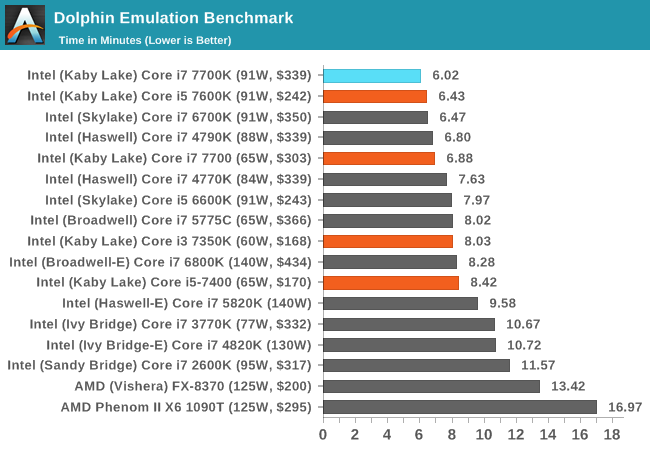
As shown by the data, the i7-7700K takes the top spot. At stock it edges out an overclocked Core i7-4790K at 4.7 GHz, which is no mean feat. Dolphin is all about high frequency and IPC, which the i7-7700K has the best of both.
WinRAR 5.0.1: link
Our WinRAR test from 2013 is updated to the latest version of WinRAR at the start of 2014. We compress a set of 2867 files across 320 folders totaling 1.52 GB in size – 95% of these files are small typical website files, and the rest (90% of the size) are small 30 second 720p videos.
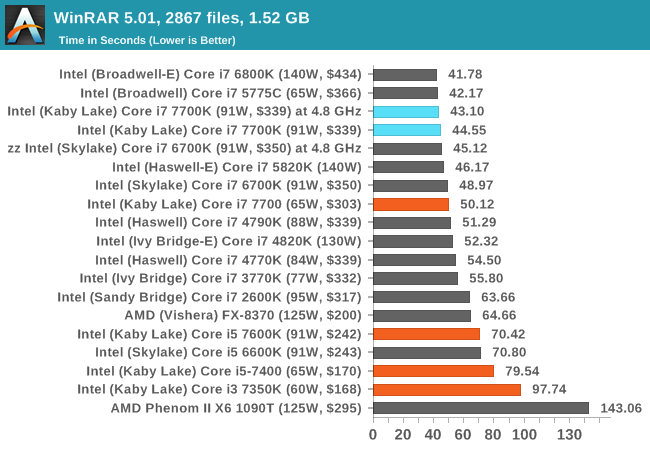
WinRAR is more geared towards a variable threaded environment but also memory speed. While two channels of DDR4-2400 does well for the Core i7-7700K, to the point where it beats the 6-core i7-5930K, anything with eDRAM (i7-5775C) and the higher end quad channel processors with up to 10 cores do win out. But at $1700 for 10-core, the Kaby Lake CPU does well – the only processor that beats it in its price range is that eDRAM-based i7 part.
3D Particle Movement v2
3DPM is a self-penned benchmark, taking basic 3D movement algorithms used in Brownian Motion simulations and testing them for speed. High floating point performance, MHz and IPC wins the day. This is the second variant of this benchmark, fixing for false sharing in the first version, and lending itself to better multithreaded performance.
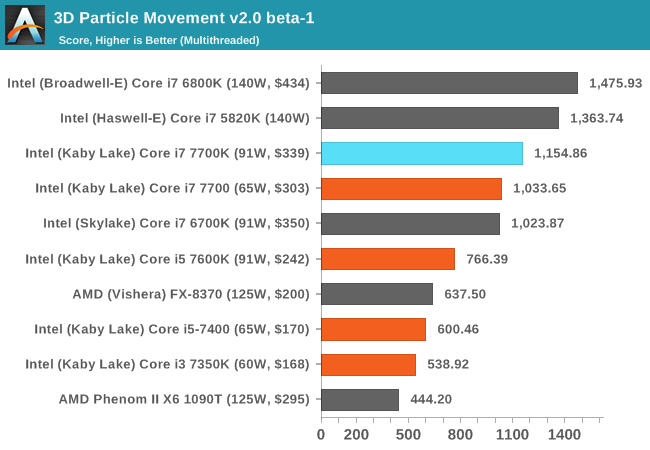
3DPMv2 is still new, so we don’t have too many results for it so far, but it hits the top of the mainstream processor stack as was perhaps to be expected. It scores almost double an FX-8370, showing how far Intel’s mainstream has come from AMD’s old CPUs, but the Core i7-7700K matches up to just over double the Core i3-7350K, as it has double the cores/threads and slightly more frequency.
SYSMark 2014
Engineered by BAPco (to which Intel is a consortium member), this set of tests are designed to be an office/data/media/financial range of tests using common well-known CAD, image editing, web browsing and other tools to put out a score, where a score of 1000 is attributed to an old Core i3 using a mechanical harddrive. Here we report the overall score, however the test breakdowns can be found in Bench.
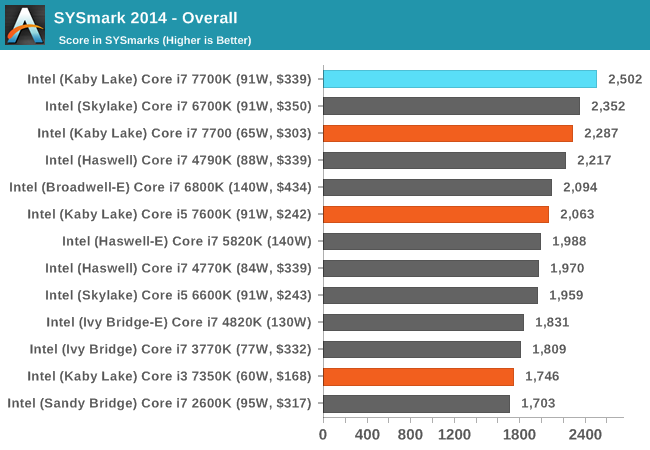
Because SYSMark is a variety of tests that rely on response and throughput, the Core i7-7700K hits the mix just right and scores higher than even a 10-core Core i7 Extreme part launched last year, as well as a highly overclocked Devil’s Canyon. Aside from the Core i5, the 7700K does well in price/performance here.
Web Benchmarks
On the lower end processors, general usability is a big factor of experience, especially as we move into the HTML5 era of web browsing. For our web benchmarks, we take well known tests with Chrome as installed by SYSMark as a consistent browser.
Mozilla Kraken 1.1
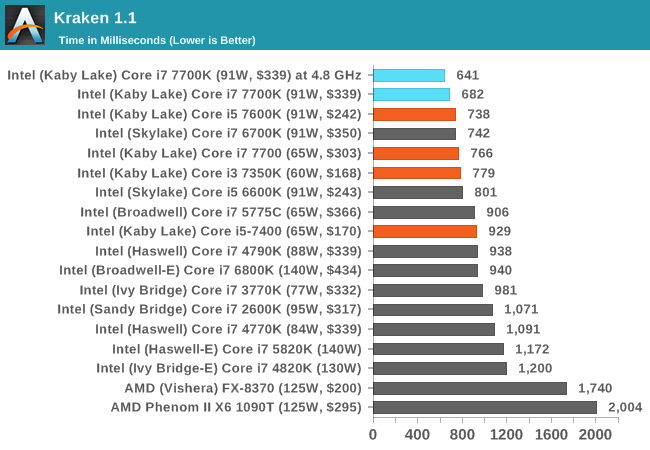
Google Octane v2
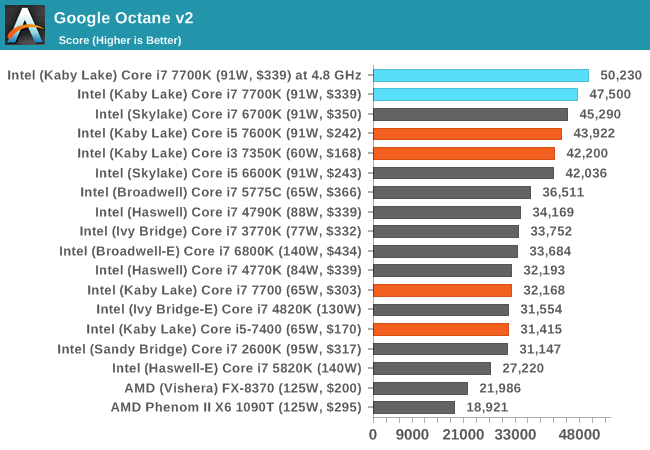










125 Comments
View All Comments
ThomasS31 - Tuesday, January 3, 2017 - link
I meant difference in high end CPUs... ofc. Sorry.Why no edit on your site? :)
pxnx - Tuesday, January 3, 2017 - link
These games are ancient, why even bother benchmarking them?Michael Bay - Saturday, January 14, 2017 - link
>2015>ancient
Mithan - Tuesday, January 3, 2017 - link
I have a 2500k, and I am going to upgrade (its 6 years old).Seriously considering a i7 7700k, people keep telling me to go for Zen because I am going to see a "big difference with games", even though those same people know that Zen will run slower on a per core basis.
I don't see this "big difference" with extra cores in todays games.
We can extrapolate based on current benchmarks, that the i7 7700k will be faster for games, as seen by using the 68xx Intel Series to compare against, even in Ashes of the Singularity.
I can see a "big difference" going from Core i5 to Core i7 or Core i5 to 6/8 Cores, but I don't see a big difference going from Core i7 to 6 or 8 cores in GAMES.
I get that unzipping documents, handbreak, etc are all going to be faster, but I don't particularly care about all those apps I rarely use (if I use them). It isn't like a 7700k is going to choke on Chrome.
I get that a 6 or 8 core will let me play a game and stream content faster (I don't stream).
Can somebody else sound in on my opinion?
DigitalFreak - Tuesday, January 3, 2017 - link
From what's known about Zen so far, you are correct. If all you care about is standard PC stuff and gaming, you're better off with a Kabey Lake i5 or i7. It looks like Zen will be cheaper but similar performing alternative to the Broadwell E processors for those that do more "workstation class" stuff. Of course that remains to be seen until we get some real unbiased benchmarks.close - Wednesday, January 4, 2017 - link
Until we see some retail parts it's hard to get an good idea about Zen. Clocks may vary from ES chips and the price might be motivating enough. 5-10% less performance for 40% lower price could be appealing to anybody who's not looking only at the very highest end of every component.close - Wednesday, January 4, 2017 - link
Also if you plan on holding onto this new CPU for a long time then go for more cores even if it comes with slightly lower clocks. You'll very likely be able to overclock it and squeeze more MHz but you'll never squeeze in more cores. And remember that 6-7 years ago dual-cores were considered the norm while today some games won't even start on a dual core.Game performance is getting less and less dependent on CPU so personally I would always go for the CPU that offers better general performance and more cores than one with slightly higher clocks that focuses the performance in games and gaming benchmarks. If you want better game performance think of a better GPU, that will actually bring palpable improvement over generations.
I'd hold on to the old 2500k for a while, until we get some nice reviews for what's coming.
carticket - Wednesday, January 4, 2017 - link
Just popping in (and registering) to echo that the 2500k is still a great CPU and this is not a great time to hop on the upgrade train with such an incremental upgrade over Skylake.I had a memory failure in my system, and that got me seriously considering a Kaby Lake upgrade, but for what would likely be a $500-600 upgrade, I just don't see a significant benefit. I say this as someone who hopped on the 970 train (upgrade from a 560 Ti) a few months before the 1070s hit the market with vastly better performance.
Toss3 - Wednesday, January 4, 2017 - link
The 7700K is going to be a massive upgrade and definitely worth it if you are currently on something older than Haswell. If your software/games are running at a decent framerate, and you really don't need to upgrade, then I'd suggest waiting as we'll start seeing 6 cores becoming the standard pretty soon (first with Zen and then with Coffee Lake).close - Wednesday, January 4, 2017 - link
Aren't we talking about the exact same massive upgrade a 6700K would have provided a year ago? If that wasn't enough to convince a user to upgrade then why would it be now?Upgrading now means they've just waited one more year with a really old CPU but ended up paying the same price for the same performance this year.
And thinking about an upgrade and those massive benefits just before we finally have a hope that AMD might launch something competitive isn't the best strategy even if your framerates already suffer. For the first time in years Intel might be forced to drop prices but why wait a couple of months when you can pay full price now for last year's CPU, right?